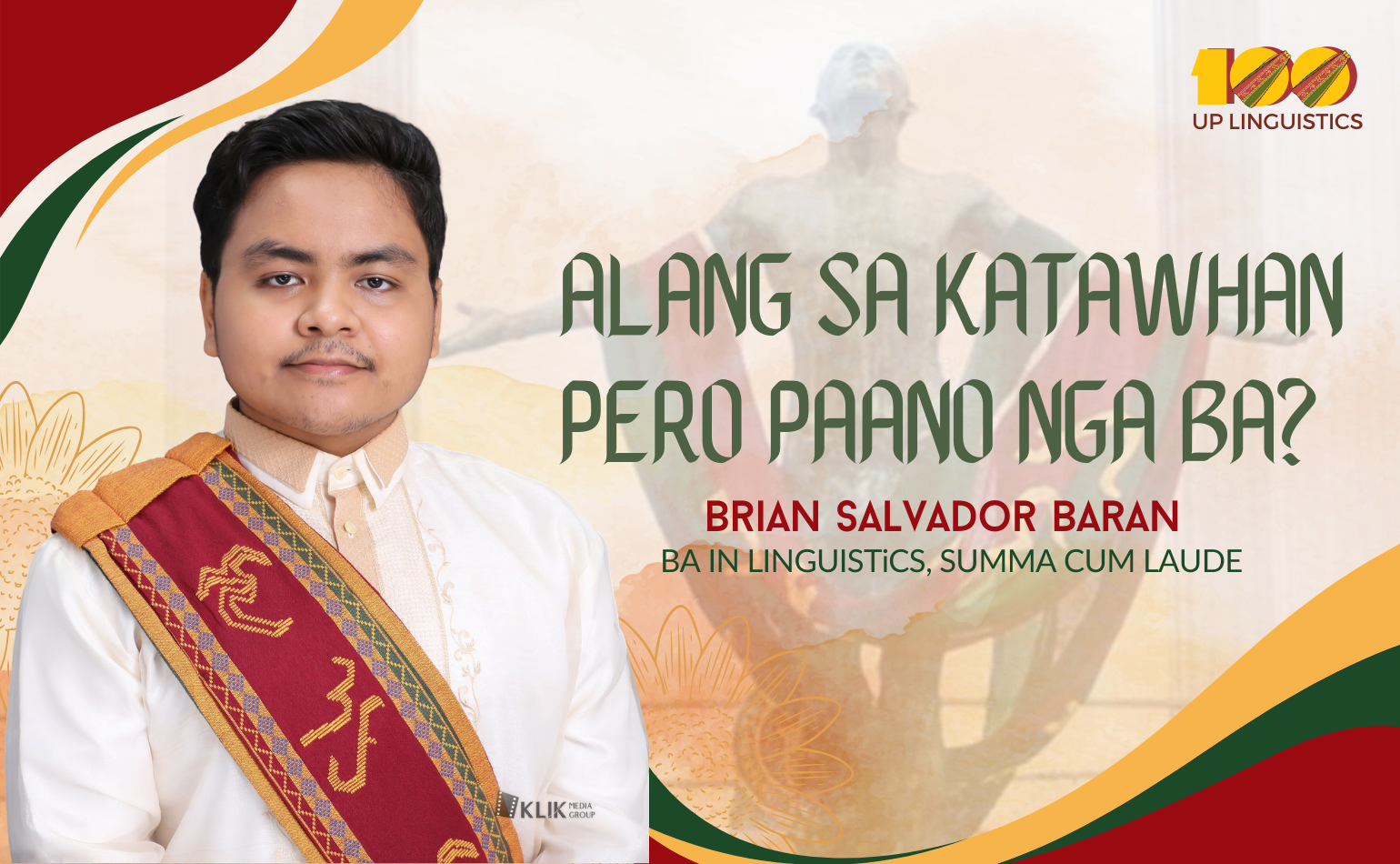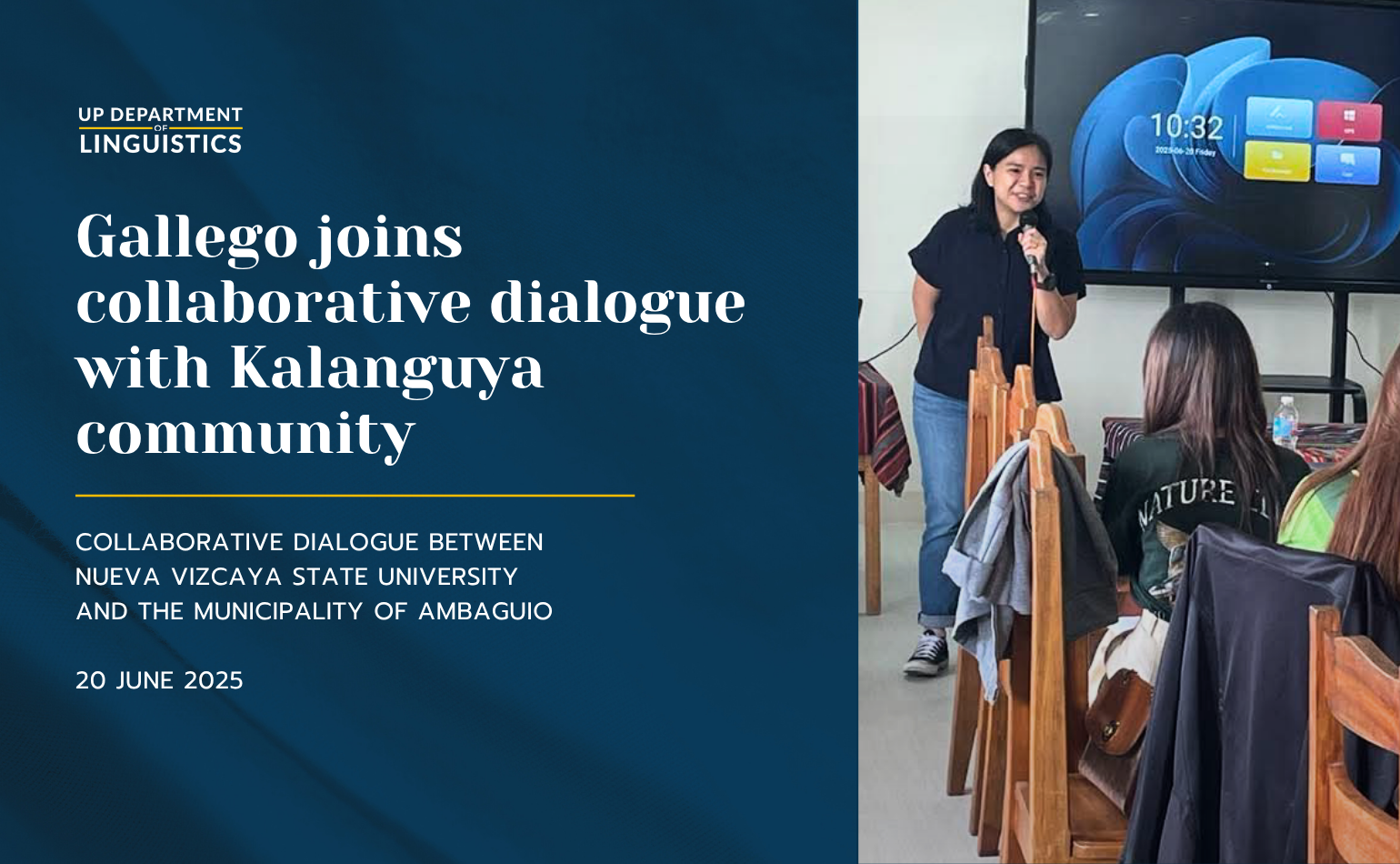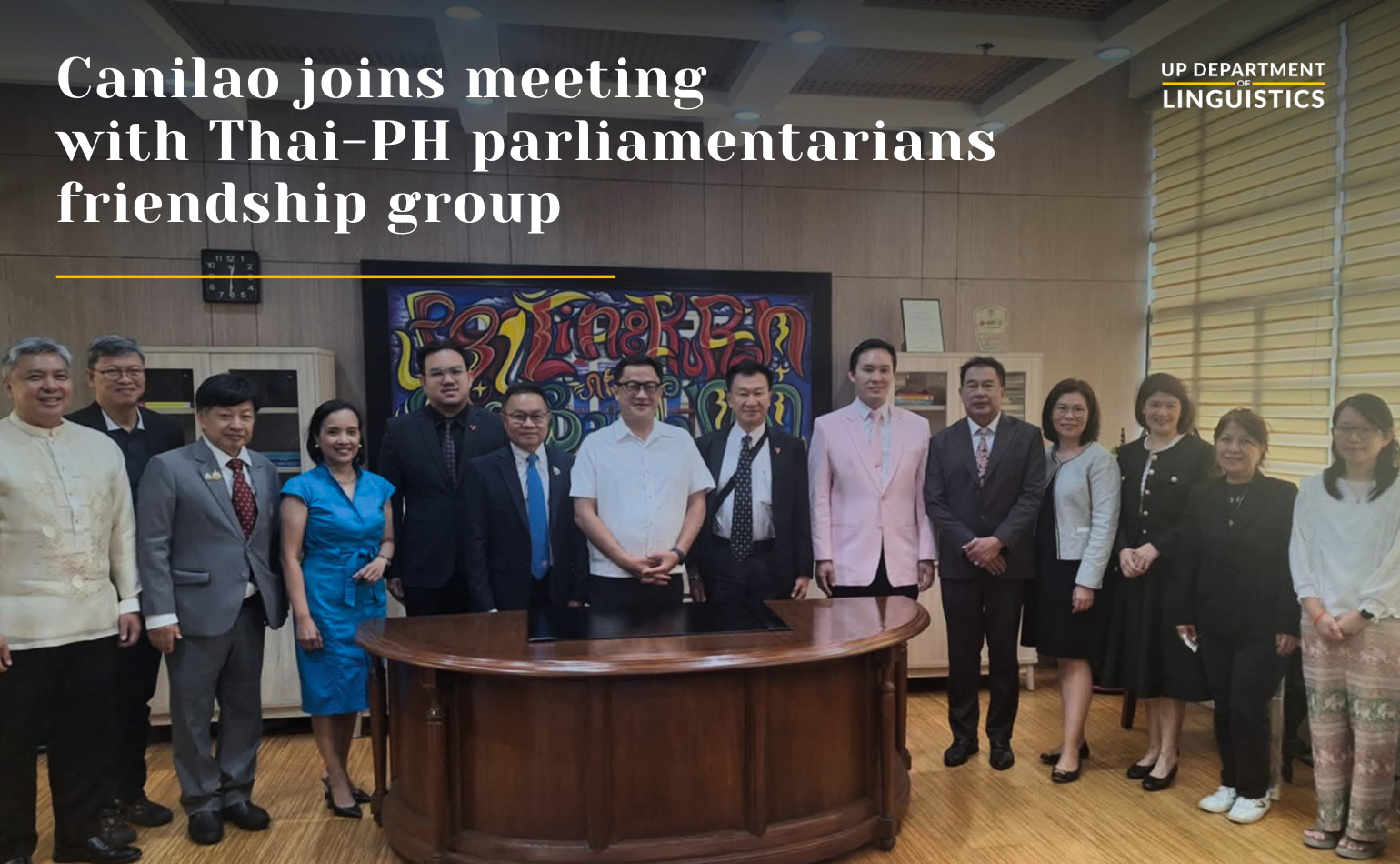
Below is the speech delivered by BA Ling summa cum laude graduate, Brian Salvador Baran, at the recognition ceremony of the College of Social Sciences and Philosophy on 29 July 2023 at the University Theater.
Sa aton guest speaker nga si Atty. Maria Leonor Robredo, sa aton Chancellor nga si Atty. Edgardo Carlo Vistan, sa aton chancellor nga si Atty. Edgardo Carlo Vistan, sa aton dean nga si Dr. Maria Bernadette Abrerra, sa aton faculty kag staff diri sa Kolehiyo ng Agham Panlipunan at Pilosopiya, sa aton mga bisita kag mga hinigugma, kag kanaton nga malamposong mga magsisipagtapos kag kilyahonon, usa ka masadyaon kag malipayong aga kanatong tanan. Maayong buntag at magandang umaga!
I recently wrote in an essay, kahibalo na ta alang kang kinsa ang linguistics, alang sa katawhan (alam na natin kung para kanino ang linguistics, para sa tao); ang dakong pangutana karon, unsaon pag-linguistics (ang mahalagang tanong ngayon, paano ba mag-linguistics)? We can replace linguistics with any other social science, with philosophy, or even any other discipline.
The gist is tayo ang Konsensya ng Bayan. Isa tayo sa mga nangunguna sa pagsulong sa mga makataong pananaliksik, makataong polisiya, at makataong pag-unlad sa bayan. Subalit, nalaman natin sa mga nagdaang ilang taon na pabigla-bigla at mabilis magbago ang mundo at hindi na sapat ang ating mga nakasanayang lunsaran at pamamaraan sa paglilingkod sa taumbayan. Gayunpaman, paano ba mapapanatiling alang sa katawhan (para sa tao) ang ating mga pagsisikap kung tayo mismo ay nakaranas ng matinding paghihirap sa pandemya? Sino ba ang katawhan? Ang ating mga sarili? Ang pamilya? Ang komunidad? Ang bayan?
We ourselves are direct witnesses to that volatile world.
Many of our years as students were spent away from the campus and inside our homes. We suddenly had to face issues that many of those before us needed not to face.
E paano nga ba mag-aral kung kusina o sala lang ang available? Paano kung kulang sa gadget? Paano kung hindi stable ang internet sa ating lugar?
Pagdating naman sa ating mga adhikain at proyekto, we end up asking: paano ba magagawa ang mga fieldwork o outreach programs kung may posibilidad na mahawa natin ang mga tinutulungan komunidad.
Despite all those difficulties, we stand here having overcome the obstacles of our new modality. Many learned to be creative—making use of what limited resources we had. Kung saan-saan ko nilagay ang cellphone ko para lang maka-full-body-shot sa NSTP doon sa masikip naming sala. Sa parehong salang pinag-o-online-class-an.
Many of us had to result to online fieldwork like when I set up makeshift recording processes for data collection sa Bantayanon community sa Cebu. Noong bigla naman kaming nawalan ng internet at kuryente nang dahil sa bagyong Odette, nagsipuntahan kaming mga estudyante sa airport para maki-internet at makasumite ng requirements.
Of course, it was not only us students who had to face these sudden changes, everyone had to. For example, the efforts by Language Warriors PH from the Department of Linguistics in localizing COVID information were some of the most creative ways to make use of the change in modality. They helped people understand the threat of the pandemic and rendered what would have otherwise been technical medical information into the local languages. This allowed ordinary Filipino families to protect themselves and their loved ones. There are definitely many many more such brilliant efforts by our students, organizations, faculty, and college.
We should be proud of ourselves for making it this far despite how severely mentally and emotionally draining most of our student lives had been. Angay ipasigarbo!
The most important thing that made us overcome the drain of our rapidly changing world, however, was compassion. Without the understanding of my professors with regards to our unstable internet and loss of electricity, I would not be standing here. Kahit may mga pagkukulang pa, the extra breaks, the lessening of requirements, and the compassion from the faculty and the college were lifesavers to both my financial situation and mental well-being.
There has also been an increase in highlighting the role of mental health in our daily lives. I am really thankful to my friends, my significant other, and my family for not only allowing me to have a space to breathe out my frustrations but also for always reminding me to not be swallowed by acads 24/7. Daghan jod kayng salamat ninyo do.
That said, not all of us were privileged enough to have the support or opportunity to bounce back from the setbacks. Marami pa rin ang napag-iwanan.
Bilang Konsensya ng Bayan, malinaw sa atin na alang sa katawhan ang ating pagsisikap, ang ating pagkamalikhain, at ang ating kakayahang makiramay—lalo na sa mga taong napag-iwanan at higit na nangangailangan kahit hindi man tugma minsan ang ating mga paniniwala. Ito ang kulminasyon ng ating mga natutunan sa iba’t ibang disiplina ng agham panlipunan at sa disiplina ng pilosopiya. Maaari mang hindi agad ang bayan ang ating mapaglilingkuran kapag sinabi nating alang sa katawhan. Maaaring para muna sa sarili, para muna sa pamilya, para muna sa sariling komunidad, hanggang sa ito ay magiging alang na sa bayan.
As we are recognized today as upcoming graduates and for our achievements, we now have to utilize what we have learned through our college experiences and apply our people-oriented perspectives and methodologies to new avenues and media, especially when these avenues themselves bring new issues such as fake news, polarization, and peripheralization. We must now also be open to working with the people directly and collaborating with communities hindi lang bilang tagapaglingkod ngunit kapwa rin taumbayan.
Are we still content with keeping our debates and discussions in the classroom? How do we make use of our new modalities to converse with and help those communities who are in need? Paano ba natin matutulungan ang mga napag-iwanan? Dapat ba natin sila dalhin tungo sa pagbabago o dapat ba natin iayon ang pagbabago sa kanila upang sila ay hindi na maiwanan? Kung gayon, paano?
Alang sa katawhan (para sa tao) ang ating mga pagsisikap. Ang marapat na nating sagutin ngayon habang sablay-sablay ang ating mga natutunan mula sa ating mga propesor ay unsaon—paano ba mag-agham-panlipunan, paano ba mag-pilosopiya, paano ba maging iskolar ng bayan?
Damo gayd kayng salamat sa pagpamati kag usa ka mapasigarbong congratulations at mabuhay to the Graduating Batch of 2023 sa College of Social Sciences and Philosophy.
Nawa ay mahanap natin ang mga sagot sa mga bagong tanong at hamon sa ating panahon.
Padayon!
Published by UP Department of Linguistics



